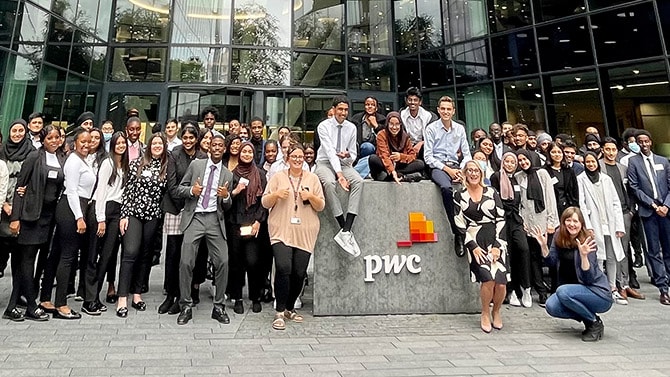PwC UK’s New world.New Skills. programme continues to upskill disadvantaged youth
PwC UK takes a hands on approach to upskilling youth and demystifying the world of work
Situation
Working towards breaking down the barriers that hinder the employability of youth
One of the pressing challenges of our time is ensuring young people have equitable access to the necessary skills for navigating the digital world. PwC UK estimates that between 20-40% of the jobs currently held by individuals aged 16-24 could potentially be automated by the mid-2030s¹.
Today, young people are faced with a complex set of obstacles² as they prepare and equip themselves with the confidence and skills necessary for the future workforce. Research conducted by the Education and Employers Taskforce³ indicates that young people who have had four or more interactions with the professional world during their school years are 86% less likely to be categorized as ‘Not in Education, Employment or Training (NEET)’ category. Furthermore, on average, they tend to earn 18% more than their counterparts who did not have similar opportunities.
PwC UK’s Social Mobility Community Programme focuses on supporting school students from lower socio-economic backgrounds, undergraduates and other social mobility beneficiary groups such as refugees. The programme brings together a community of PwC UK professionals, who are passionate about delivering community programmes in their local regions.
Experience
Since the end of 2021, PwC UK has adopted a blended approach to their programmes, enabling them to engage with a larger number of students across a wider geographical area. The core focus is their Schools Series programme, which invites groups of secondary school students into PwC UK offices for a day. This approach is particularly beneficial for students from lower socio-economic backgrounds.
PwC UK’s Social mobility team delivers their Schools Series programme twice a year, engaging students aged 14-18 in the Autumn and students aged 11-14 in the Spring. The programme focuses on helping students build skills for employability and demystify the world of work. In collaboration with the Skillsbuilder Partnership⁵, PwC UK identifies key skills to help students prepare for their future.
The programme takes place across all PwC UK office locations, inviting groups of students for a day-long visit. Delivered in a classroom setting, students are presented with two project briefs to explore and devise solutions for, which are later presented to their peers. The day also includes an office tour, providing students with further insights into the workplace. These visits are supported by PwC UK volunteers working with the students to help challenge their thinking and encourage ideation.
This in person programme is supplemented by PwC UK’s Virtual Schools Series. The team launched a virtual Dragons’ Den programme targeted at 11-18 year olds in schools in England, Wales, Northern Ireland and Scotland. The programme is designed to develop the students’ entrepreneurial skills, build awareness of emerging technologies and enable the students to find confidence to be able to participate in the future workforce.
The workshops consist of bite sized pre-recorded skills sessions led by PwC UK staff. These sessions are complemented by tasks that can be carried out under a teacher’s guidance in the classroom. To assist teachers in facilitating these tasks, PwC UK has developed a supportive resource, the Dragon’s Den: Teacher handbook too. The pre-recorded sessions focus on learning about:
- The 8 emerging technologies
- How to develop an idea and problem solving
- How to create a pitch to sell your idea
After the sessions, students are encouraged to develop a pitch that outlines the problem they aim to solve and their proposed solution. They are then invited to present their pitch to the class for feedback.

In August, 2023 PwC UK delivered their unique New world. New skills. Work Experience programme for the third year that welcomed 231 students from lower socio-economic backgrounds aged 16-17 years to join a paid week long work experience at PwC UK. Throughout the week, students participated in different sessions hosted by PwC UK staff that focussed on:
- Understanding the different business units within PwC
- Problem solving
- Speaking and listening
- Wellbeing
Students spent the majority of the week working from the PwC UK office with the option to work from home on one day if they preferred, and all students were supplied with a laptop for the week.
PwC UK’s Social Mobility team has recently expanded into primary schools, with a successful pilot in summer 2023. There is an increasing body of research which highlights the importance of “starting early” with careers-related learning and engaging with primary-aged children.
The key part of this programme is the Primary Insight Day, which invites children aged 9-11 into PwC UK offices. The day is designed to inspire primary-aged children about the world of work. Students spend the day learning about PwC, meeting some of our people and taking part in activities to learn more about the type of work we do and help them develop essential skills for their future.
New World. New Skills - Schools Series overview
Impact
Demystifying the workplace, creating an inclusive more equitable approach to the workforce of the future
Of those students attending the 2023 New world. New skills. Work Experience programme, 53% were female, 30% were Black and 36% were from ethnic minority backgrounds⁶. PwC UK’s Social Mobility team’s aim is to run their Work experience programme every year across all their PwC UK offices and have plans to recruit 250 students for the August 2024 cohort.
“Being able to come in and visit and speak to employers and hear their journeys, hear their pathways into that career was really beneficial to them, because it opens up their minds, opens up their world to all the opportunities that are available to them.”
Following PwC UK’s New world. New skills Work Experience programme, the Schools Series ran for four weeks in Autumn, with another series planned for the Spring for younger groups. The programme has expanded year on year, and the Autumn series saw PwC UK work with:
- Over 45 schools across the UK
- More than 1700 students aged 14-18*
- Involving over 200 PwC UK volunteers from across most of PwC UK offices
On completion of the programme, teachers rated their students’ key skills against a Skills Builder Benchmark.⁷ PwC UK found that all schools who completed the form saw an increase in their skills including speaking, creativity, teamwork and problem solving following participation in the Schools Series.
*Eligible schools were required to meet PwC UK’s social mobility criteria which is aimed at social mobility target secondary schools (age 11-18 years) in England. Including schools with a higher than average proportion of students in receipt of free school meals⁸ (as per Department for Education publically available data) and schools in coldspots⁹, places that have few opportunities for social progress.
¹PwC UK, 2018. How will automation impact jobs? Website link.
²Elks, S., 2021. Donated laptops are bridging the 'digital divide' for children in UK lockdown, World Economic Forum.
³Dr Mann, A., Dr Kashefpakdel, E.T., Rehill, J., Professor Huddleston, P., 2017. Contemporary transitions: Young Britons reflect on life after secondary school and college. Education and Employers.
⁴Skillsbuilder Partnership, 2022. Website.
⁵PwC UK Social Mobility team, May 2022.
⁶PwC UK Social Mobility team, January 2024.
⁷Skillsbuilder Partnership Benchmark, 2022. Website
⁸UK Department of Education, 2021. Free School Meals
⁹UK Social Mobility Commission, 2017. State of the Nation 2017, p.6
















